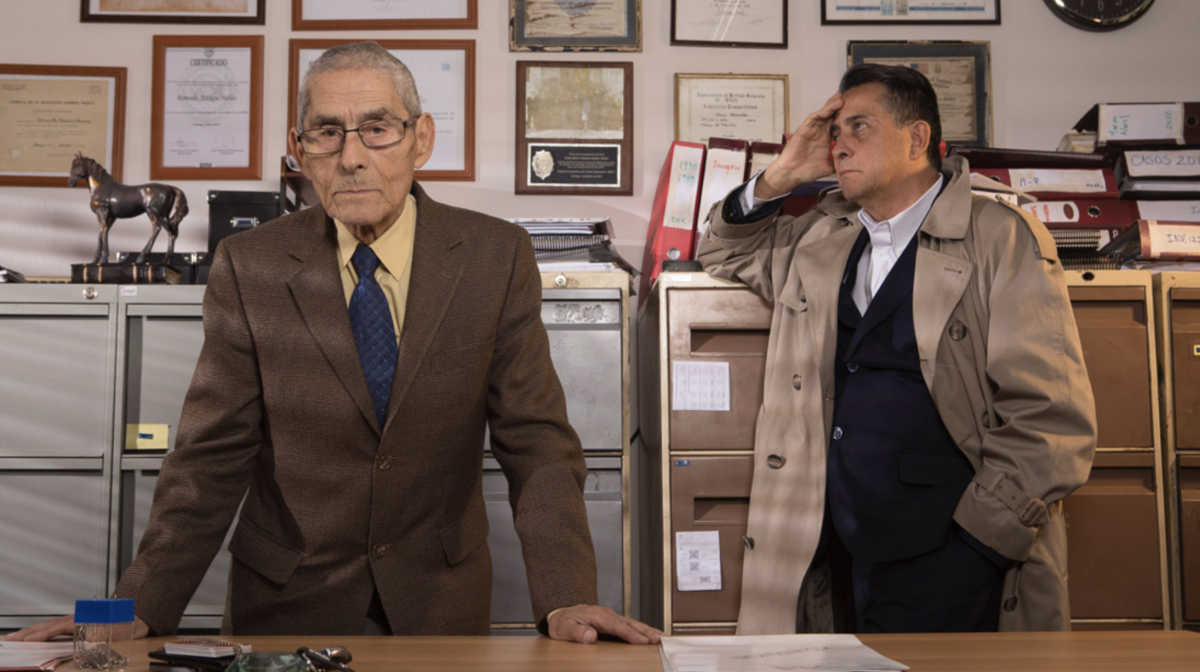
Detective Rómulo Aitken posted an ad in a Chilean newspaper. It read: “Man needed. Between the ages of 80 and 90 years.” And thus, his recruiting process for a spy began.
In the new spy documentary “The Mole Agent,” director Maite Alberdi produces observations on friendship, age and abandonment as the main protagonist goes undercover in a nursing home.
Aitken has a mission for his spy. His client requires an investigation into her grandmother’s nursing home for possibilities of abuse. Aitken’s intention is to recruit someone capable of being his mole. Hence the title.
Sergio Chamy is the main guy. He’s 83 years old and in remarkably good shape. Chamy is all things charismatic and sociable and he’s always in a great mood. He’s a first-time spy, though. Now, what could go wrong?
At the beginning of the film, Aitken gives Chamy lessons on component spy behavior. Aitken’s favorite and probably most-quotable line during the film is, “be prudent.” But of course, Chamy isn’t. Quite frankly, he is terrible at being discreet.
Aitken hands Chamy a smartphone, which he has no clue how to use. Next, Aitken gives Chamy a sleek pair of eyeglasses that have a hidden built-in camera. Later, Chamy breaks them.
These spy lessons are completely laughable, partly because Chamy is so inept and also because he is an old person. When young people see old people operate technology, it tends to make us chuckle.
But I believe that is the main focus of the film. Director Alberdi gives a lense to view old people and how they feel, live and interact as they age. The film uses all real retirees, members of the nursing home, and none of the scenes are staged.
When Chamy arrives at the nursing home in Chile, all the ladies swoon over him. Chamy’s approximately 10 years younger and he’s good-looking. And as one lady put, “he’s a gentleman.” Sidenote: the nursing home has a men to women ratio of 1-to-10.
Shot 40 miles outside of Santiago, Chile, the nursing home has a ravishing backdrop. We see shots of wild roses, red and ornamental, and the condensation on blue irises. The sunbeams on green grasses. The nursing home is made of clay. Inside, the walls are painted an exuberant orange, the floors are tiled. There is so much vibrant color.
Chamy takes his job seriously as a spy. He learns all the member’s names. He listens to their stories about life and family, he offers them advice. The audience observes sharp personalities in the members. The audience begins to feel zealous compassion for them, for how they feel.
One old woman writes her own poetry.
Another lady, Marta Olivares, has no one to visit her. Every week, the nurses give her a cell phone and she speaks with her mother. But really, it’s just another nurse pretending to be her mother on the other line.
Compassionately, Olivares asks why her mother hasn’t been by to see her.
The camera is often cutting to Oliveras saying, “my mother is going to pick me up soon.”
Olivares has really quick hands. Whenever she sees something, she takes it. In fact, a greater chunk of her collected items happen to belong to other members of the nursing home. When Aitken pressures Chamy to uncover who is the nursing home thief, he is reluctant to say.
Olivares has become his friend. It is very hard for anyone to stay mad at her.
Chamy finds himself meditating comfortably at the nursing home. During the nursing home’s anniversary party, they crown him king. They dance and eat cake. A petite old lady, Berta Ureta, confesses her love to Chamy, but no worries, he lets her down easy.
Though, the camera cuts to a scene where a frozen frown is upon Ureta’s face. She said she had never loved anyone before.
“The Mole Agent” is heartwarming and beautiful. It’s easy to watch because it’s hilarious in the way it captures each character’s behavior. Essentially, the film satirizes the whole spy premise to evoke a deeper meaning ingrained in the nursing home setting. That is, aging is sad because of the way our society handles it.
At some point, Chamy becomes quite fatigued. His viewpoint on the investigation is now jaded. There is no abuse here, Chamy states. Instead, the real abuse is that these elders are lonely. Here, in the nursing home, no one from their family’s visit. No one calls. These women feel abandoned and sad.
The film is a larger take on the experiences elders undergo when they are put into a nursing home. The irony is that we all age, yet we are so quick to ignore those who have aged. It’s easier if elders aren’t in our space. It’s easier to live our lives, but these people feel loneliness. They crave the company of their families.
In one scene, an elderly woman is dispirited. Chamy sees her unhappiness and asks, “What’s wrong?”
The old woman tells him she is scared. She needs her medicine to feel better, but that would require walking. To walk would require her to ask someone for help, and she is tired of asking for help when she wants to move.
Chamy tells the woman “just cry.” Just cry and you’ll feel relief. The old woman’s shoulders slouch. Her vivid blue eyes look down, away and off into the orange and yellow sunset. She says, “I don’t know who I am anymore.”
She begins to weep openly. She is full of sadness, but letting it out feels much better.
Chamy’s daughter arrived to pick him up at the nursing home two days later. The women watched from the windows as Chamy descended the gates, suitcase in hand. I realize that Chamy’s time there gave a new perspective on life. How aging is inevitable, and we should acknowledge that fact.
Edited by George Frey | [email protected]